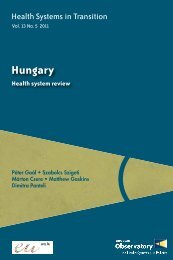Canada - World Health Organization Regional Office for Europe
Canada - World Health Organization Regional Office for Europe
Canada - World Health Organization Regional Office for Europe
You also want an ePaper? Increase the reach of your titles
YUMPU automatically turns print PDFs into web optimized ePapers that Google loves.
<strong>Health</strong> systems in transition <strong>Canada</strong> 21<br />
The provinces exercise the primary policy responsibility <strong>for</strong> funding and<br />
administering health care. In most provinces, health services are organized and<br />
delivered by geographically organized RHAs, although in some there are severe<br />
limitations on the scope of activities undertaken by RHAs (e.g. in Ontario,<br />
RHAs have no responsibility over primary health care). RHAs have been<br />
delegated by provincial ministers of health to administer hospital, institutional<br />
and community care within defined geographical areas either by delivering<br />
the services directly or by contracting with other health care organizations and<br />
providers. However, RHAs are not responsible <strong>for</strong> pharmaceutical coverage<br />
or physician remuneration. Instead, provincial ministries of health run drug<br />
plans that subsidize the cost of prescription drug therapies <strong>for</strong> residents,<br />
mainly <strong>for</strong> the poor or retired people who do not have access to PHI. Most<br />
physicians have private practices but deliver services funded and paid <strong>for</strong> by<br />
provincial ministries. Physicians receive remuneration based on fee-<strong>for</strong>-service<br />
schedules or alternative payment contracts that are periodically renegotiated<br />
with provincial ministries of health (see section 2.3.1).<br />
Since health care is mainly a provincial responsibility, <strong>Canada</strong>’s ten<br />
provinces and three territories are responsible <strong>for</strong> providing Canadians with<br />
coverage <strong>for</strong> medically necessary hospital and physician services as well as<br />
access to other health goods and services. Delivery is effected through private<br />
profit-making, private non-profit-making and public organizations as well as by<br />
physicians who receive remuneration from provincial ministries of health – 74%<br />
on a fee-<strong>for</strong>-service basis and 26% through alternative <strong>for</strong>ms of remuneration.<br />
The federal government is responsible <strong>for</strong> food and drug safety, pharmaceutical<br />
patents and price regulation <strong>for</strong> branded drugs, and the en<strong>for</strong>cement of the<br />
<strong>Canada</strong> <strong>Health</strong> Act through funding transfers to the provinces. The Government<br />
of <strong>Canada</strong> also provides public health surveillance as well as funding and<br />
infrastructure <strong>for</strong> health data and health research. Through the <strong>Canada</strong> <strong>Health</strong><br />
Transfer to the provinces and territories, the federal government has the capacity<br />
to en<strong>for</strong>ce some national conditions <strong>for</strong> insured services as defined under the<br />
<strong>Canada</strong> <strong>Health</strong> Act.<br />
Fig. 2.1 is a highly simplified overview of the governance of publicly<br />
financed health care in <strong>Canada</strong>.
















